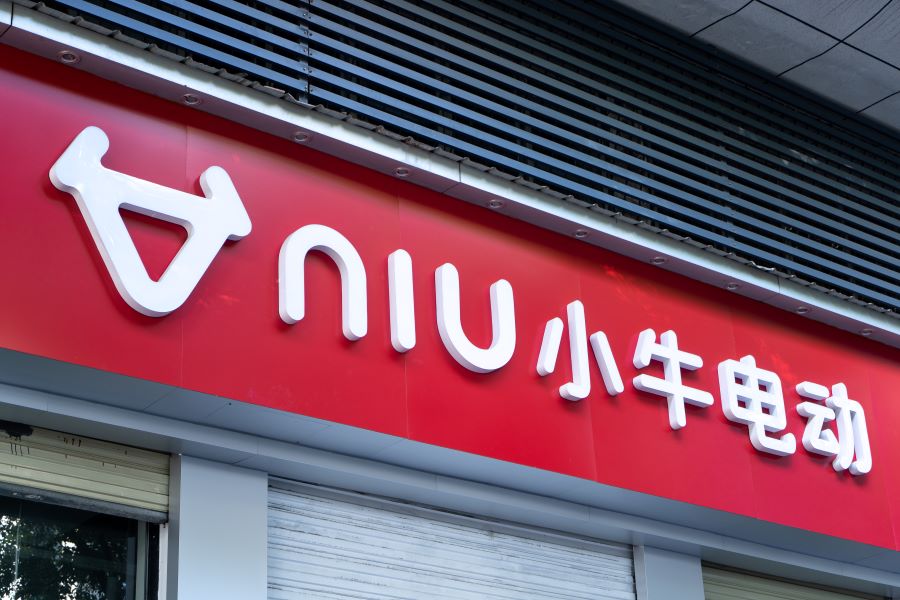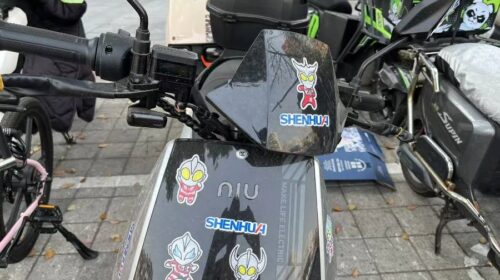Rising Costs, Growing Competition Skewer Shrinking Niu Technologies

Company logs fourth-quarter profit drop as margins get squeezed by surging lithium battery costs and lower prices for its electric scooters
Key Takeaways:
- Electric scooter maker Niu Technologies’ profit fell 18% in the fourth quarter, squeezed by rising material costs and growing competition
- Company forecast revenue growth would slow to 20% to 30% in the first quarter from 47% in the fourth quarter
By Doug Young
Some might call it “The incredible shrinking bull.”
That’s our assessment after release of the latest quarterly results from electric scooter maker Niu Technologies (NIU.US), whose name means “bull” in Chinese. While the analyst community remains quite bullish on the company, just about everyone else seems to be stampeding away from its U.S.-listed shares these days.
Niu already pre-announced some of its fourth-quarter results in January, so people knew roughly what was coming. But the full report still spooked investors, sparking a sell-off that saw the shares plunge 17% on Monday, hitting an all-time low after the announcement.
All told, the stock has lost about 80% of its value over the last 52 weeks, driving its market value down from more than $3 billion at this time last year to a current $622 million.
So what exactly sent investors running for the door in the latest report?
The answer appears to be the “shrinking bull” theme we mentioned earlier. Headlining that trend was the company’s forecast that its revenue growth would slow sharply in this year’s first quarter. At the same time its margins are also dropping due to rising costs, most notably for the lithium batteries that are suddenly in huge demand as electric-powered vehicles rapidly gain traction in both China and worldwide.
We’ve noted in the past how Niu looks well positioned to benefit from the move to electric-powered vehicles due to its status as one of the world’s leading electric scooter makers. China has been especially notable in promoting such clean-powered vehicles as it races to achieve its goals of reaching peak carbon emissions by 2030 and going carbon neutral by 2060.
Such policies have helped Niu achieve healthy double-digit growth over the last few years. Most of that has come from China, which accounts for about 90% of its sales. But the company is also trying to build up an international network to export its success to other markets hungry for its clean-energy vehicles.
While booming demand looks good in theory, it also tends to spawn copycats, especially in China. One such company, Kandi Technologies (KNDI.US), is typical of that trend, shifting gears from its traditional mini electric cars over the last two years to move into scooters. Booming demand also tends to raise costs. In this case, surging demand from both electric car and scooter makers sparked a recent 10% to 20% surge in lithium battery costs that are one of the main power sources for both, Niu CEO Li Yan said on Niu’s earnings call.
“Starting in January this year, we’re starting to see lithium battery (prices) really shoot up,” he said.
Those sharply rising costs forced the company to raise its prices in China by 5% at the start of this month. It also plans to raise prices in international markets next month.
Shrinking margins
Even before the January spike in lithium battery prices, Niu was already feeling the squeeze from rising material costs as the world faces a wave of the worst inflation in decades. That drove the company’s gross margin down to 22.6% in last year’s fourth quarter from 25.2% a year earlier.
But margins weren’t the only thing shrinking at Niu. The company also forecast its revenue in this year’s first quarter would grow between 20% and 30% to between 657 million yuan ($104 million) and 712 million yuan. Such growth might look healthy for a more mature company, but marks a sharp slowdown from the 46.7% revenue growth Niu reported in the fourth quarter, and 51.6% growth for all of 2021.
The company forecast its unit scooter sales for all of this year would rise by a healthier 45% to 64% to between 1.5 million and 1.7 million units.
The big discrepancy between stronger unit sales growth and far weaker revenue growth is the result of falling average selling prices (ASPs) for Niu’s products. A big part of that decline owed to recent popularity for Niu’s kick scooters and e-bikes that typically sell for less than its mainstay electric scooters. But competition is also a factor.
Niu said its ASPs fell 7.3% in the fourth quarter. Chinese prices actually held relatively stable during the period, with revenue per scooter down just a slight 0.9% during the three months. Instead, the decline was mostly fueled by a 36% drop in revenue per scooter from its international operations, much of which the company blamed on the surging popularity for its kick scooters.
With all that shrinkage in its financial statement, it should come as little surprise that Niu reported its net income fell 18% for the quarter year-on-year to 47.6 million yuan, reversing profit gains in the previous two quarters.
Despite all the headwinds, the company indicated it will stay the course with the recent aggressive expansion of its store network – a move that looks necessary to maintain its leading position but will also be costly. Executives said on the call the company plans to add 1,000 branded stores this year, equating to a roughly one-third expansion of its domestic network that stood at 3,108 stores at the end of last year.
Even after the recent pressure on its shares, Niu’s stock is still valued relatively strongly compared with its peers. It trades a trailing price-to-earnings (P/E) ratio of 26, compared with a 23 for Kandi and an 18 for Italy’s Piaggio (PIA.MI).
The analyst community remains even more bullish on the company, with all nine analysts polled by Yahoo Finance rating the company either a “buy” or “strong buy” in January and February. Their average price target for the company stands at a lofty $36, or more than four times its latest price. Such divergence between bullish analysts and bearish investors has become all too common these days for overseas-listed Chinese stocks, which really do look like bargains at their current levels.
To subscribe to Bamboo Works free weekly newsletter, click here






